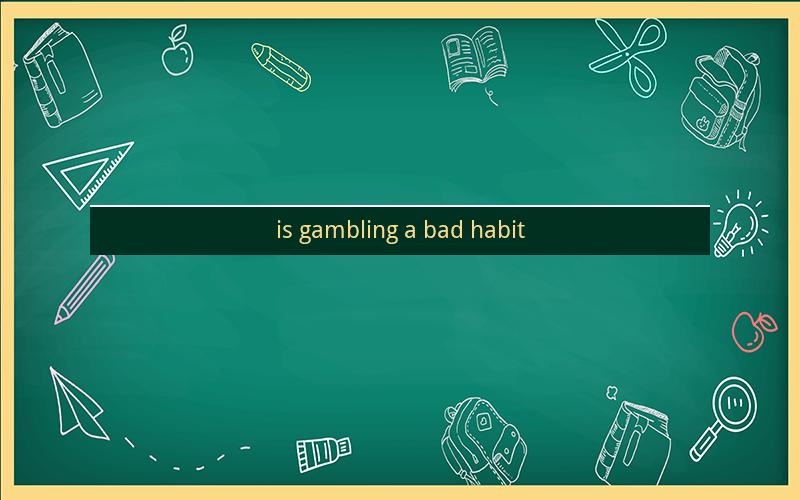
Contents
1. Introduction to Gambling
2. The Definition of a Bad Habit
3. The Negative Consequences of Gambling
4. Psychological Impacts
5. Financial Consequences
6. Social and Personal Relationships
7. Legal and Ethical Considerations
8. Prevention and Treatment
9. The Role of Society and Government
10. Conclusion
1. Introduction to Gambling
Gambling has been a part of human culture for centuries. It involves risking money or something of value on an event with an uncertain outcome, with the intent of winning more money or something of value. The act of gambling can take many forms, including casinos, sports betting, lottery tickets, and online gaming.
2. The Definition of a Bad Habit
A bad habit is defined as a behavior that is detrimental to one's health, well-being, or productivity. It is a repeated action that is difficult to break and often has negative consequences. When it comes to gambling, the line between a harmless pastime and a dangerous addiction can be blurry.
3. The Negative Consequences of Gambling
The negative consequences of gambling can be far-reaching. They include:
- Financial Ruin: Individuals who are unable to control their gambling can lose significant amounts of money, leading to debt, bankruptcy, and financial instability.
- Mental Health Issues: Compulsive gambling can lead to depression, anxiety, and other mental health problems.
- Physical Health Issues: Stress and anxiety related to gambling can also lead to physical health issues, such as headaches, stomach problems, and heart disease.
4. Psychological Impacts
Gambling can have a profound impact on an individual's psychological well-being. The thrill of winning and the fear of losing can create a powerful emotional rollercoaster. This can lead to:
- Addiction: Compulsive gambling is a recognized addiction, characterized by a strong urge to gamble despite negative consequences.
- Mood Swings: Individuals who are addicted to gambling may experience intense mood swings, ranging from euphoria to despair.
5. Financial Consequences
The financial consequences of gambling can be devastating. Individuals who are unable to control their gambling can lose their homes, cars, and other possessions. They may also be forced to rely on friends, family, or government assistance to survive.
6. Social and Personal Relationships
Gambling can also have a negative impact on an individual's social and personal relationships. They may become isolated from friends and family, and their relationships may suffer as a result. They may also experience:
- Divorce: Compulsive gambling can lead to marital problems and even divorce.
- Loss of Employment: Individuals who are unable to control their gambling may miss work or perform poorly, leading to job loss.
7. Legal and Ethical Considerations
Gambling is legal in many countries, but it is subject to strict regulations. These regulations are designed to protect individuals from the negative consequences of gambling. However, there are still ethical concerns surrounding gambling, including:
- Addiction: The potential for addiction makes gambling an ethically questionable activity.
- Exploitation: Some argue that gambling companies exploit vulnerable individuals who are unable to control their gambling.
8. Prevention and Treatment
Preventing and treating gambling addiction requires a multifaceted approach. This includes:
- Education: Educating individuals about the risks of gambling can help prevent addiction.
- Support Groups: Support groups can provide individuals with the tools and resources they need to overcome their addiction.
- Treatment: Treatment for gambling addiction can include therapy, medication, and lifestyle changes.
9. The Role of Society and Government
Society and government play a crucial role in preventing and treating gambling addiction. This includes:
- Regulation: Governments can regulate gambling to protect individuals from the negative consequences of gambling.
- Education: Governments can also educate individuals about the risks of gambling.
- Support Services: Governments can provide support services for individuals who are struggling with gambling addiction.
10. Conclusion
Gambling is a complex activity with the potential for both positive and negative consequences. While it can be a fun and exciting pastime, it can also be a dangerous addiction. It is important for individuals to be aware of the risks and to seek help if they are struggling with gambling addiction.
Questions and Answers
1. What are the signs of a gambling addiction?
2. How can I prevent myself from becoming addicted to gambling?
3. What resources are available to help individuals overcome a gambling addiction?
4. Can gambling be a form of therapy?
5. How does gambling affect the brain?
6. What is the difference between a hobby and an addiction?
7. How can I protect my loved ones from the negative consequences of gambling?
8. Can gambling be a form of self-harm?
9. What is the most effective treatment for gambling addiction?
10. How can I help someone who is struggling with a gambling addiction?